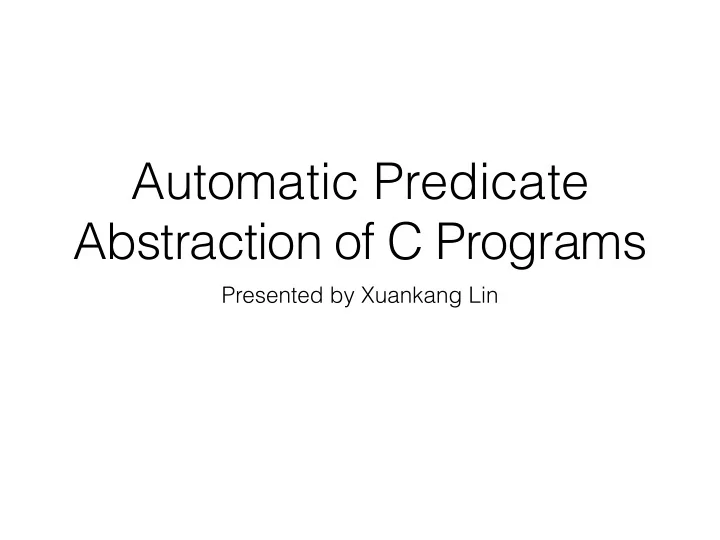

Automatic Predicate Abstraction of C Programs Presented by Xuankang Lin
Outline • Main contribution • Introduction to C2BP • Challenges of Predicate Abstraction in C • Conclusion
Main Contribution • Model checkers typically operate on abstractions of systems. • Use predicate abstraction to model check real softwares. • The first to apply Predicate Abstraction to real world programming languages (C).
Outline • Main contribution • Introduction to C2BP • Challenges of Predicate Abstraction in C • Conclusion
C2BP - Demo
C2BP • Given a C program P and a set E = { φ 1 , φ 2 ,…, φ n } of predicates, C2BP automatically constructs an abstraction of P, i.e. a boolean program BP(P,E). • BP(P, E) is a program that has identical control structure to P but contains only |E| boolean variables. • “Abstraction”: the set of execution traces of BP(P,E) is a superset of the set of execution traces of P. • Soundness: a path in P => a path in BP(P, E)
After C2BP • BP(P, E) can be analyzed precisely using a BEBOP that performs inter-procedural data-flow analysis using binary decision diagrams. • BEBOP is a symbolic model checker for boolean programs. • BEBOP can generate an invariant representing the reachable states at a program point of the boolean program. • This invariant can be useful, e.g. to refine alias information.
Outline • Main contribution • Introduction to C2BP • Challenges of Predicate Abstraction in C • Conclusion
Challenges of Predicate Abstraction in C • Pointers • Procedures & Procedure Calls • Unknown Values • Precision-efficiency tradeoff
Challenge - Pointers & Aliasing • Use weakest liberal precondition to propagate. WP(op, Q) • “weakest”: ∀ P . {P} op {Q}, P => WP(op, Q) • Problem: { Q[e/x] } x := e { Q } does not hold with pointers! • e.g. WP(x := 3, *p > 5) is not *p > 5. Because p may points to x.
Challenge - Pointers & Aliasing • Solution: divide into two cases, when there is aliasing & when there isn’t. • For WP(x:=e, φ ) where y is a pointer mentioned in φ • φ [x, e, y] = (&x = &y /\ φ [e/y]) \/ (&x ≠ &y /\ φ ) • Constraint on C program: no multiple dereference (e.g. **p)
Challenge - Pointers & Aliasing • Worst case: Exponential! • C2BP uses a pointer analysis to improve the precision of the WP(op, Q) computation. • If the pointer analysis says that x and y cannot be aliases, only one branch of the \/ is needed.
Challenges of Predicate Abstraction in C • Pointers • Procedures & Procedure Calls • Unknown Values • Precision-efficiency tradeoff
Challenge - Procedure & Procedure Calls • Procedure Calls can be challenging when there are pointers. • Needs to update those that may have been modified by the function) • Two Passes 1. Generate signatures of each function in isolation. 2. Each procedure can be abstracted given only the signatures of the abstractions of its callees. • Modular
Challenge - Procedure & Procedure Calls • A signature of a procedure P is: // P’ is its BP(P, E) 1. F P , the set of formal parameters of P 2. r, the return variable of P 3. E f , the set of formal parameter predicates of P’ 4. E r , the set of return predicates of P'
Challenge - Procedure & Procedure Calls • E f is the subset of predicates that do not refer to any local variables of R. • E r contains those predicates that mention return variable but do not mention any (other) locals, as callers will not know about these locals. • For a call of form v := P(a 1 , a 2 , ..), any predicate that mentions • v / a global variable / a (possibly transitive) dereference of an actual parameter to the call • must be updated.
Challenges of Predicate Abstraction in C • Pointers • Procedures & Procedure Calls • Unknown Values • Precision-efficiency tradeoff
Challenge - Unknown Values • Some effect in C may be hard to determine. • So they just use "*" to represent non-deterministic, as that in • if (*) { assume(…) … }
Challenges of Predicate Abstraction in C • Pointers • Procedures & Procedure Calls • Unknown Values • Precision-efficiency tradeoff
Challenge - Precision vs. Efficiency • Running time of C2BP is dominated by the cost of theorem proving. • Worst case is exponential. • Several optimizations to reduce the number of calling a theorem prover. 1. If a subset of formula can already imply φ , the whole formula implies φ 2. Update values of boolean variable only when necessary 3. Reduce the number of boolean variables. 4. Use syntactic heuristics.
Outline • Main contribution • Introduction to C2BP • Challenges of Predicate Abstraction in C • Conclusion
Conclusion - Effectiveness • Used in the SLAM toolkit to • Discover invariants regarding check temporal safety array bounds checking and properties of Windows NT list-manipulating code. device drivers.
Conclusion • Their approach may also be used to deal with other real world languages while applying predicate abstraction. • C2BP only handles given predicates. • They have another tool NEWTON to generate and refine predicates automatically. • Only for single-thread programs (at least in this paper).
Outline • Main contribution • Introduction to C2BP • Challenges of Predicate Abstraction in C • Conclusion • Questions?
Recommend
More recommend